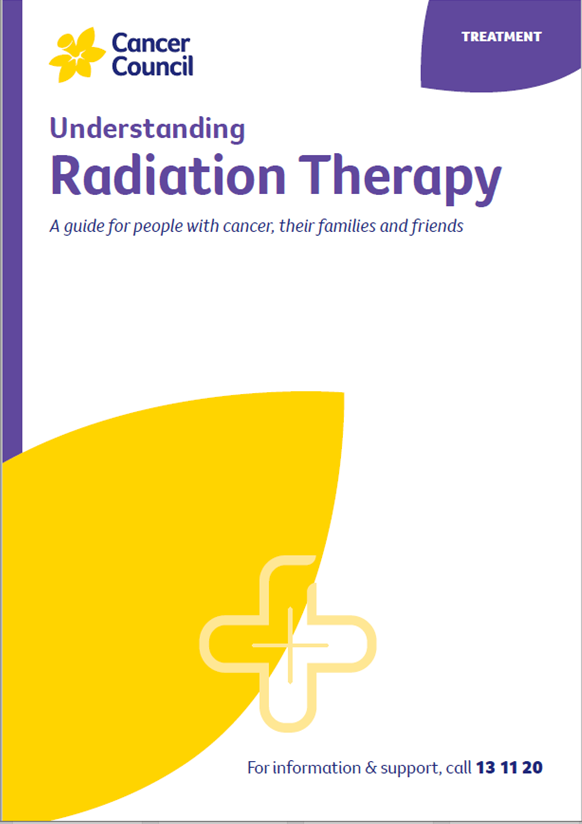- Home
- Bowel cancer
- Treatment for early bowel cancer
- Radiation therapy
Radiation therapy for bowel cancer
Radiation therapy (or radiotherapy) uses a controlled dose of radiation to kill or damage cancer cells so they can’t grow, multiply or spread. Radiation therapy may be given on its own or with chemotherapy (chemoradiation), which makes cancer cells more sensitive to radiation.
Learn more about:
When radiation therapy is used
Radiation therapy may be recommended for rectal cancer but is rarely used to treat colon cancer. You may have radiation therapy at the following times.
| Before surgery (neoadjuvant) | Radiation therapy is used before surgery to shrink the tumour. This makes it easier for the surgeon to remove the cancer and reduces the risk of the cancer coming back. |
| After surgery (adjuvant) | If rectal cancer is more advanced than expected, radiation therapy may be used after surgery to kill remaining cancer. This is only if radiation therapy wasn’t given before surgery. |
Having radiation therapy
What is external beam radiation therapy?
External beam radiation therapy (EBRT) is the most common radiation therapy for rectal cancer. A machine called a linear accelerator delivers a high dose to the affected area, with lower doses to surrounding tissue, reducing side effects.
Planning your treatment
You will meet with your radiation oncologist for them to explain details about treatment, the number of sessions you need to have and whether you will have chemotherapy with your radiation treatment. For your radiation oncologist to design your treatment, a planning CT scan will be done in the treatment position. Small marks, like a freckle, may be made on your skin to help set you up in the exact same position for each treatment. It may take a few weeks to plan the treatment.
What to expect during treatment
Treatment is given daily, on weekdays. During treatment, you lie on the table of the radiation therapy machine. Each time you have treatment, you lie in the same position as you were in when you had the planning CT scan.
How long does each session take?
Each treatment only takes a few minutes, but you may be on the treatment table for 10–20 minutes because of the time it takes to set you up accurately. The treatment is painless and can’t be seen or felt.
After treatment and before surgery
After finishing neoadjuvant treatment, there will be a break before surgery. This gives time for the radiation therapy to have its full effect.
Learn more about radiation therapy.
Side effects of radiation therapy
Most side effects are temporary and go away weeks or months after treatment. Feeling tired is common. Radiation therapy for rectal cancer is usually given over the pelvic area, which can affect your sexual function and ability to have children (fertility).
Radiation therapy can also irritate the bowel and bladder. This may mean:
- needing to pass urine (wee or pee) more often or burning when you do (cystitis)
- redness and soreness in the treatment area
- needing to poo urgently/suddenly or incontinence
- diarrhoea
- constipation
- mucus or small amounts of blood coming out of the anus.
Radiation therapy can cause the skin or internal tissue to become less stretchy and harden (fibrosis). It can also inflame the lining of the rectum (radiation proctitis).
People react to radiation therapy differently, so some people may have few side effects, while others have more. Your treatment team will talk to you about possible side effects and how to manage them.
Learn more about radiation therapy.
Radiation proctitis
Radiation to the pelvic area can affect the lining of the rectum, causing inflammation and swelling (known as radiation proctitis). This can lead to a range of side effects including diarrhoea and bleeding from the rectum, the need to empty the bowels urgently, and loss of control over the bowels (faecal incontinence).
These side effects may appear shortly after radiation therapy for rectal cancer, but are generally not an ongoing problem because the rectum is then removed during surgery.
Your treatment team will talk to you about the risk of developing radiation proctitis and ways to cope with bowel changes.
Find information on radiation therapy in Arabic, Greek, Simplified and Traditional Chinese, and Vietnamese.
→ READ MORE: How radiation therapy affects sexual function and fertility
Video: What is radiation therapy?
Watch this short video to learn more about radiation therapy (Open settings ![]() to turn on auto-generated subtitles in your language).
to turn on auto-generated subtitles in your language).
Podcast: Making Treatment Decisions
Listen to more episodes from our podcast for people affected by cancer
Prof Alexander Heriot, Colorectal Surgeon and Director Cancer Surgery, Peter MacCallum Cancer Centre, Director, Lower GI Tumour Stream, Victorian Comprehensive Cancer Centre, VIC; Dr Cameron Bell, Gastroenterologist, Royal North Shore Hospital, NSW; Graham Borgas, Consumer; Prof Michael Bourke, Director of Gastrointestinal Endoscopy, Westmead Hospital, The University of Sydney, NSW; Laura Carman, 13 11 20 Consultant, Cancer Council Victoria, VIC; Amanda Connolly, Specialist Bowel Care Nurse, Icon Cancer Centre Windsor Gardens, SA; A/Prof Melissa Eastgate, Operations Director, Cancer Care Services, Royal Brisbane and Women’s Hospital, QLD; Anne Marie Lyons, Stomal Therapy Nurse, Concord Repatriation General Hospital and NSW Stoma Ltd, NSW; Lisa Nicholson, Manager Bowel Care Services, Bowel Cancer Australia, NSW; Stefanie Simnadis, Clinical Dietitian, St John of God Subiaco Hospital, WA; Rafi Sharif, Consumer; Dr Kirsten van Gysen, Radiation Oncologist, The Nepean Cancer and Wellness Centre, NSW; Sarah Williams, Clinical Nurse Consultant, Lower GI, Peter MacCallum Cancer Centre, VIC.
View the Cancer Council NSW editorial policy.
View all publications or call 13 11 20 for free printed copies.
